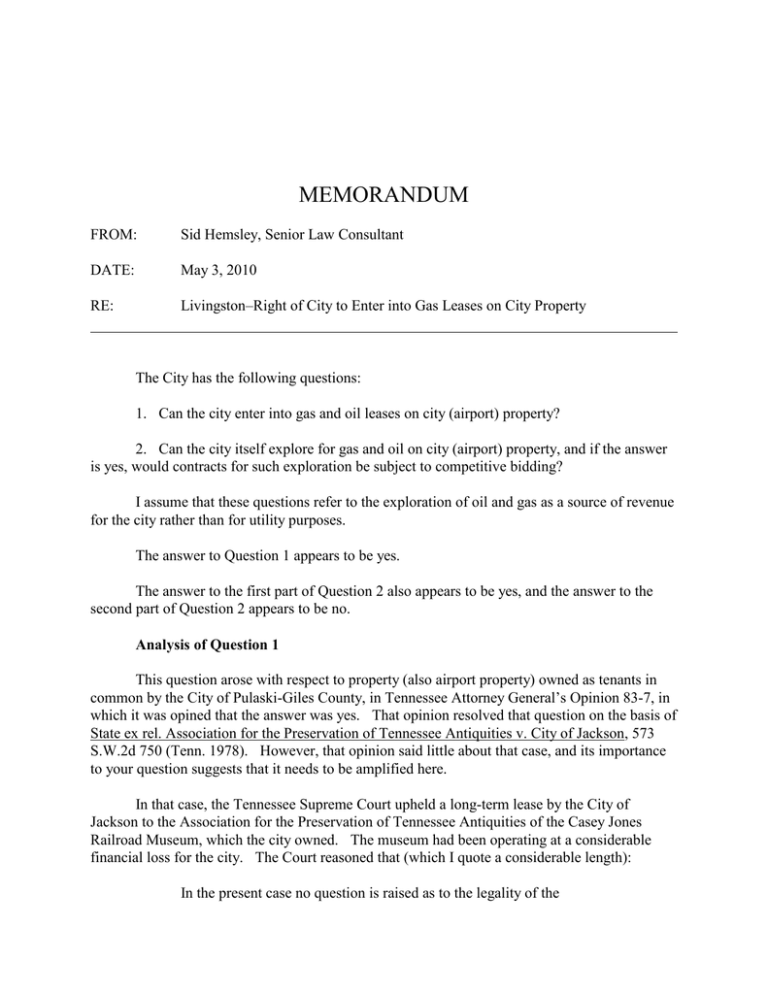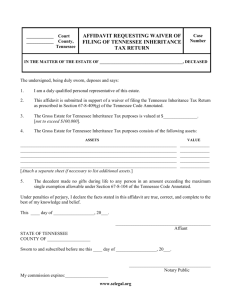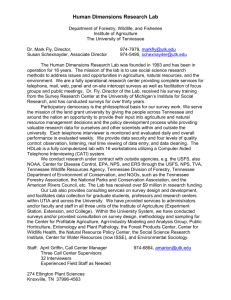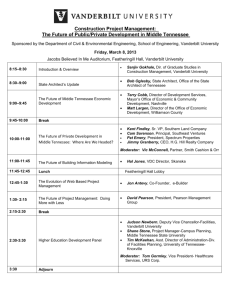Right of City to Enter into Gas Leases
advertisement

MEMORANDUM FROM: Sid Hemsley, Senior Law Consultant DATE: May 3, 2010 RE: Livingston–Right of City to Enter into Gas Leases on City Property The City has the following questions: 1. Can the city enter into gas and oil leases on city (airport) property? 2. Can the city itself explore for gas and oil on city (airport) property, and if the answer is yes, would contracts for such exploration be subject to competitive bidding? I assume that these questions refer to the exploration of oil and gas as a source of revenue for the city rather than for utility purposes. The answer to Question 1 appears to be yes. The answer to the first part of Question 2 also appears to be yes, and the answer to the second part of Question 2 appears to be no. Analysis of Question 1 This question arose with respect to property (also airport property) owned as tenants in common by the City of Pulaski-Giles County, in Tennessee Attorney General’s Opinion 83-7, in which it was opined that the answer was yes. That opinion resolved that question on the basis of State ex rel. Association for the Preservation of Tennessee Antiquities v. City of Jackson, 573 S.W.2d 750 (Tenn. 1978). However, that opinion said little about that case, and its importance to your question suggests that it needs to be amplified here. In that case, the Tennessee Supreme Court upheld a long-term lease by the City of Jackson to the Association for the Preservation of Tennessee Antiquities of the Casey Jones Railroad Museum, which the city owned. The museum had been operating at a considerable financial loss for the city. The Court reasoned that (which I quote a considerable length): In the present case no question is raised as to the legality of the May 3, 2010 Page 2 initial acquisition of the “Casey Jones Museum” by the City of Jackson or the property of its subsequent use by the City for the combined cultural, commercial and educational purposes shown in the record. It seems to use, therefore, at a minimum, that it was a matter of judgment to be exercised by the duly elected City officials as to whether the continued operation of that facility at a financial loss was or was not in the public interest and as to whether the leasing of the facility for operation under private management was or was not a suitable alternative. We find no abuse of discretion by the City officials in their decision to permit the removal of the residence and artifacts from their original site. The lease amply secures the City in the event of a default by tenant. The City may then terminate the lease short notice and require the tenant to restore the properties to the original site or to any other public location. No question is raised in the present record as to the solvency or responsibility of the tenant. Insofar as prior cases have held that cities are without authority to dispose of publically owned facilities by lease, sale or otherwise, where the properties are held in a “governmental capacity,” we are of the opinion that each case must be examined in light of its own facts and circumstances. Obviously cities must be and legally are free, within their charter provisions, to dispose of outmoded, surplus or unprofitable properties, where these are not held under a grant imposing a specific trust or other limitation upon ownership or use. [Emphasis is mine.] In the present case the Jackson charter expressly confers upon the city, without limitation, the authority: “To acquire or receive and hold, maintain, improve, sell, lease, mortgage, pledge, or otherwise dispose of any property, real or personal, and any estate or interest therein, within or without the City or State.” The charter also contains language that its terms are not to be deemed restrictive and that they shall be construed “...so as to permit the City to exercise freely any one or more such powers as to any one or more such objects for any one or more of such purposes.” May 3, 2010 Page 3 We are not prepared to decide this case solely upon the proposition that the City may have acquired and held the “Casey Jones Museum” in part at least, in a “proprietary” capacity. On the other hand, we are of the opinion that appellants have failed to demonstrate that the subject lease is contrary to the public interest, that it represents a misuse or abuse of the discretion and authority of the Board of Commissioners, or that it is in any other way ultra vires or beyond the legitimate charter powers of the City. [At 775] The language of your City Charter with respect to the sale or other alienation of city property is similar to the language in the Jackson City Charter. Section 10 of the charter provides, “That the Mayor and Aldermen shall have full power and authority to sell and convey, lease, and otherwise dispose of all property, real and personal, belonging to the corporation as to them shall seem best .... and all conveyances from the corporation shall be executed by the Mayor officially.” Under that provision, your City appears to have broad discretion with respect to the terms under which it alienates city property, even having the express power to lease it. That case also stands for the proposition that the courts could look at the question of whether a gas and oil lease would be an abuse of discretion on the city’s part. The City of Jackson in Association for the Preservation of Tennessee Antiquities, leased the property to the Association, with reasonably good assurances that the lease was financially advantageous to the city. Presumably, your City would do the same thing with regard to a gas and oil lease. Several years after Tennessee Antiquities, the question of whether a local government could enter into a contract that exceeded the term of the sitting board arose in Washington County Board of Education v. Marketamerica, 693 S.W.2d 344 (Tenn. 1985). That case involved a contract made by a school board with a private company that extended past the term of the sitting board. The Court rejected the proprietary-governmental distinction as a basis for resolving that case, declaring that: As this Court noted in State ex rel. Association For The Preservation of Tennessee Antiquities v. City of Jackson, 573 S.W.2d 750, 754 (Tenn. 1978), “we do not find the dichotomy of ‘governmental’ and ‘proprietary’ functions to be particularly helpful from a standpoint of legal analysis....” Attempts to distinguish contract entered into in “governmental” as opposed to “proprietary” capacities contributes only ambiguity and confusion. Courts have been altogether unsuccessful in defining the scope of “governmental” functions. See Garcia v. San Antonio Metro May 3, 2010 Page 4 Transit Authority, 469 U.S. _______, 105 S. Ct. 1005, 83 LED.2d 1016 (1985). [At 348-49] The court went on to uphold the contract, rejecting several claims that the county did not have the authority to make such contracts. One of those claims was that Tennessee Code Annotated, § 49-2-203(a)(11) and § 49-2-204, and earlier case law interpreting those statutes prohibited counties from entering into such contracts. Tennessee Code Annotated, § 7-51-801, which was a product of Public Acts 1983, Chapter 186, allowed counties to enter into long-term contracts of various kinds, but, as the parties conceded, was adopted after the contract was executed by the parties. But the Court, pointing to the legislative history of that statute, declared that: Senator Cohen and Representative Burnett, the Senate and House Sponsors of the bill, [Public Acts 1983, Chapter 186] indicated that the bill “only clarifies what cities could always do.” One sponsor further stated that the legislation was intended to clarify the law in this area because an opinion of the Attorney General had suggested that counties lacked the capacity to enter into contracts requiring payment beyond the current fiscal year. The new legislation and the debate concerning it illustrates that the legislature never intended that Chapter 2 of Title 49 served as a limitation upon the authority of counties to enter into long-term contracts. Comments of the sponsors also indicate that the legislation was intended to eliminate any distinction in contractual capacity between the “governmental” and “proprietary” functions of local government. The new statute effectively obliterates the distinction as it relates to contractual capacity of local governments.... [At 349] That case appears to support the proposition that even before it was decided cities had the right to enter into long-term contracts that extend past the term of a sitting board, and that if there were any doubts about whether counties had that authority, Tennessee Code Annotated, § 7-51-901 et seq., gave it to “municipalities,” in which the same statute defined “Municipality” as “any county or municipality or incorporated city or town of the state of Tennessee.” Analysis of Question 2 The question of whether a city can itself explore for gas and oil on city lands for the purposes of raising revenue, rather than enter into gas and oil leases with private companies to explore for gas and oil on city lands, involves the question of whether a municipality can compete with private business. The extent to which local governments can go into competition May 3, 2010 Page 5 with private companies, generally, is not clear in Tennessee. That question arose in Tennessee Attorney General’s Opinion 81-9, and little guidance is found there. The opinion does point out that Tennessee Code Annotated, § 6-54-110 expressly authorizes municipalities to explore for oil and gas: (a) Notwithstanding any other provisions of law, a municipality, its agencies or divisions thereof, may within or without the state of Tennessee engage in investigating, exploring, prospecting, drilling and mining for and producing natural gas and oil and mineral by-products thereof, and construct the appropriate facilities to produce, save, take care of, maintain, treat and transport natural gas and oil and mineral by-products thereof, or by contract for same with any person, federal agency, municipality or public or private corporation. This statute is not part of a statutory scheme involving municipal utilities, or the securing of supplies of oil and gas for such utilities. Arguably, this statute stands for the proposition that municipalities have broad authority to engage in the gas and oil business for the purpose of generating municipal revenues. Tennessee Attorney General’s Opinion 98-175 also seems to support that proposition. Professional services cannot be competitively bid under Tennessee Code Annotated, § 12-4-1-6. Among those types of services that statute makes professional services are architectural and engineering services. I am not sure how the city plans to secure drilling services--whether it will divide the gas and oil exploration function from the drilling function, and secure the gas and oil exploration work and the drilling work separately, or whether it will bundle those two functions together and purchase both as a package. It is opined in Tennessee Attorney General’s Opinion 00-086 that design-build construction contracts are not contracts for professional services because the bulk of such contracts involve construction that does involve architects and engineers. Arguably the same thing is true of drilling for gas and oil, on the premise that gas and oil exploration is a professional service, but the actual drilling is not. I can find no cases in the United States that support that conclusion, but I do not feel comfortable with it. While I am not an expert in the exploration for gas and oil, it seems to me from what I have read about the oil industry in connection with this question, there is a more pronounced connection between the “design” of where to explore for gas and oil, and the “build” of the drilling component of the exploration, which includes the operation of drilling equipment. Both functions appear to involve a far greater and more ongoing participation of geologists, oil engineers, and other engineers of various kinds and descriptions in the operation of those facilities than there is in general design-construction of buildings and other facilities. May 3, 2010 Page 6 I may be off the mark on that point, but that point leads me to believe that the drilling component of gas and oil exploration is a professional service that should not be competitively bid.







